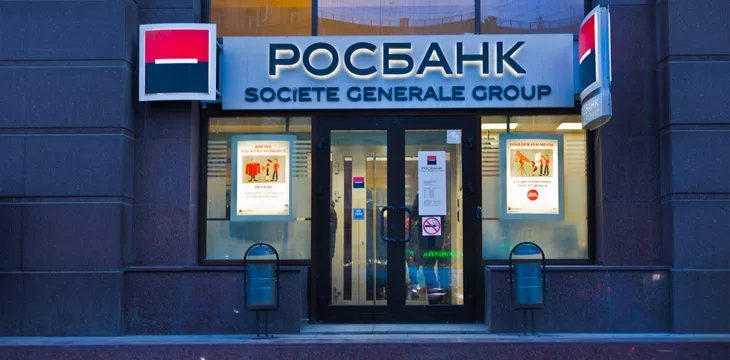Russian banking giant Rosbank has confirmed plans to allow merchants to use digital currencies to settle cross-border transactions amid crippling economic sanctions.
Currently, banks are command Conduct pilots in collaboration with several companies and private organizations. With this solution, Rosbank will rely on fintech company B-crypto to provide a “fully compliant” operational and technical infrastructure.
The Bank of Russia is adamantly opposed to the use of digital currencies within its borders, but supports the use of digital currencies in international payments. According to Rosbank, the company’s first proposal would allow B-crypto to purchase digital currencies abroad without violating existing regulations, and to fund the overseas supply.
To facilitate transactions, local merchants deposit fiat currency into Rothbank accounts after receiving an invoice and a digital currency address for payment. Rosbank transfers funds to his B-crypto to purchase digital assets on behalf of local merchants according to Know Your Customer (KYC) rules.
At the moment, the amount of fees charged by B Crypto remains unknown and the novelty of its offering makes it almost impossible to guess. Alexei Voylkov, deputy head of the Russian Bankers Association, said such a solution does not exist in the country’s commercial banks.
This service is mainly aimed at domestic corporations, but not for individual retail use. Despite claiming to comply with the law, the Treasury Department and central bank have yet to issue a statement in support of the proposal.
Russian regulators are vying for ideas to circumvent centralized sanctions imposed by the West. The Russian Central Bank and the Ministry of Finance have agreed to use digital currencies and Central Bank Digital Currencies (CBDCs) as a true method for handling international transactions.
In early 2023, the country was on the cusp of launching a nationwide digital currency exchange, but abandoned the plan citing disagreements with major financial regulators.
Non-residents may also have access to CBDC
Russian parliamentarians have amended a bill regulating the digital ruble pilot to allow greater access to CBDCs for foreign users. The State Duma Financial Markets Committee aims to allow non-residents to trade digital rubles through foreign banks or central banks.
The Russian Central Bank is now eyeing cross-border deals of CBDCs with China and other allies. Despite high ambition, the launch of the CBDC pilot was derailed by delays in introducing a legal framework to guide the experiment.
Read below to learn more about central bank digital currencies and the design decisions you need to consider when creating and launching them. nChain’s CBDC Playbook.
Watch: Blockchain and Banking
New to Bitcoin? Check out CoinGeek Bitcoin for beginners This section is the ultimate resource guide for learning more about Bitcoin and blockchain, originally conceived by Satoshi Nakamoto.


